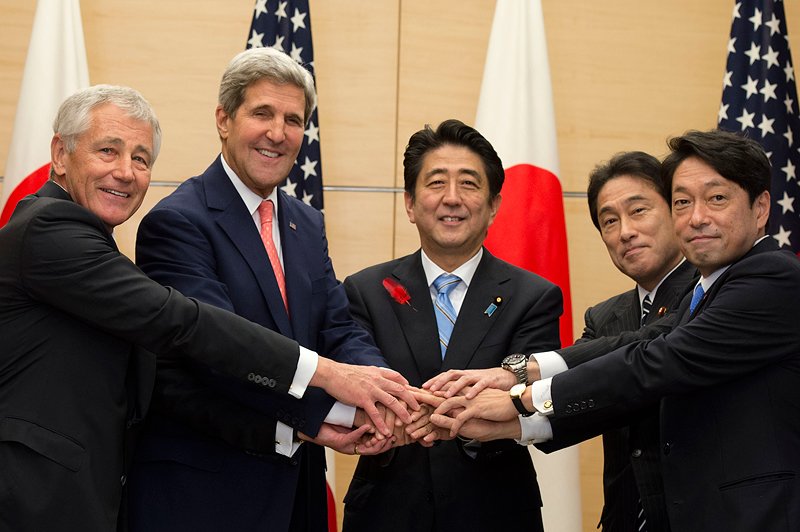Speaking in February on a panel with Judge Shunji Yanai, on the constitutional and international law issues arising from the Japanese government’s “reinterpretation” of the war-renouncing Article 9 of the Constitution. Shunji Yanai, who is a judge on the International Tribunal for the Law of the Sea, was the chairman of the Advisory Panel on the Reconstruction for the Legal Basis of Security, which made recommendations to the Japanese government on how and why to “reinterpret” Article 9. The one-day conference was held at the Asser Institute in The Hague, with Judge Hisashi Owada of the International Court of Justice giving the keynote address.
use of force
Questioning U.S. Support for Japan’s National Security Moves
(Published in JURIST – Forum, Sept. 2, 2015)
 On August 30, tens of thousands of Japanese citizens demonstrated outside of the Diet (parliament), and in other cities across Japan, protesting against draft national security legislation that would expand the permissible operations of the Self-Defense Forces (SDF). The bills are the culmination of an effort by Prime Minister Shinzo Abe to expand Japan’s role in international collective security efforts. To do so, however, the government has sought to “reinterpret” Japan’s constitutional limits on the use of military force, in a manner that circumvents the formal constitutional amendment process, and thereby undermines the rule of law and constitutionalism in Japan.
On August 30, tens of thousands of Japanese citizens demonstrated outside of the Diet (parliament), and in other cities across Japan, protesting against draft national security legislation that would expand the permissible operations of the Self-Defense Forces (SDF). The bills are the culmination of an effort by Prime Minister Shinzo Abe to expand Japan’s role in international collective security efforts. To do so, however, the government has sought to “reinterpret” Japan’s constitutional limits on the use of military force, in a manner that circumvents the formal constitutional amendment process, and thereby undermines the rule of law and constitutionalism in Japan.
It is this process as much as the substance of the bills that has provoked the protests and triggered a constitutional crisis in Japan. Yet these developments have been largely welcomed in US policy circles. The objectives may be in America’s short-term interest, but a deeper understanding of the issues and a longer-term perspective would caution against US endorsement of this illegitimate process.
Constitutional Background
To understand the issues one has to begin with the constitutional limits. Article 9 of the constitutionrenounces war as a sovereign right of the nation, and the threat or use of force for the settlement of international disputes (Art. 9(1)). It also prohibits the maintenance of armed forces or other war potential (Art. 9(2)). These provisions have been consistently interpreted by the Cabinet Legislation Bureau (CLB) (which is loosely analogous to the US Office of Legal Counsel) and successive governments since the early 1950s, as meaning that Japan was entitled to use force for individual self-defense in the event of an armed attack on Japan; and that Japan was thus entitled to maintain a minimum level of armed forces necessary for such defense. This understanding was also implicitly confirmed by the Supreme Court in the Sunagawa decision, the only decision it has rendered on the issue. But the CLB has also clearly maintained that Art. 9(1) means that Japan is prohibited from any participation in collective self-defense as authorized by Article 51 of the UN Charter, or other collective security operations as authorized by the UN Security Council under Articles 39 and 42 of the UN Charter.
Re-Examining the ‘Myths’ About Japan’s Collective Self-Defense Change
(Co-authored with Bryce Wakefield – published in The Asia-Pacific Journal: Japan Focus, Sept. 8, 2014)
In a recent article in the Diplomat, Michael Green and Jeffrey Hornung claimed that critics of the Abe government’s “reinterpretation” of Japan’s constitution, to end the ban on the use of force for the purposes of collective self-defense, were “basing their opposition on myths about the change.” This allegation that resistance to the “reinterpretation” of Article 9 is based on nothing but “myths” is increasingly heard, and so it is worth examining their arguments, and the so-called myths that they purport to dismiss.
Green and Hornung argued that the changes to be made through the “reinterpretation” were actually slight and that the immediate implications were far less problematic than alleged. There is a grain of truth to this as it relates to imminent strategic consequences, but it also misses the essential point. Yes, at least in the short term, changes to the roles and the missions of the nation’s Self Defense Forces resulting from “reinterpretation” will probably be modest; and yes, the changes will not likely lead to militarism, regional adventurism, or various other scenarios that the article examines and dismisses. But this focus on the intended policy shifts misses the far more significant issues raised both by the unconstitutional nature of the move and the possible longer-term and profound systemic ramifications of the “reinterpretation.”
It is precisely because the immediate strategic implications of the Abe Cabinet’s announcement will probably be relatively modest that the implications for constitutional practice in Japan should be the focus of the debate. Perhaps the changing strategic environment in Asia will require Japan to consider relaxing some of the constraints imposed by Article 9. However, so fundamental a change to the nation’s constitution should only come after broad debate and pursuant to formal amendment procedures as provided for in the constitution. As explained below, the so-called “reinterpretation” process has in fact weakened constitutionalism, the rule of law, and fundamental principles of democracy in Japan, an argument that Green and Hornung, and many other defenders of the “reinterpretation”, never seriously address. In short, the harm is to the Constitution, and so focus on strategy is no answer.
Let us re-examine some of the “myths” that Green and Hornung so quickly dismiss.



